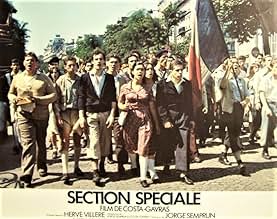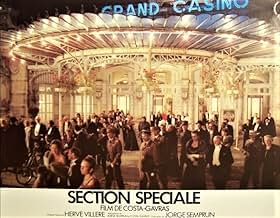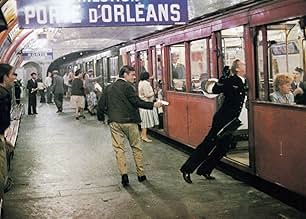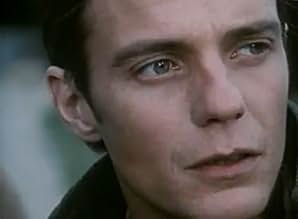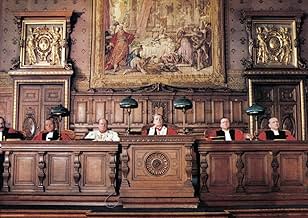Section spéciale
- 1975
- Tous publics
- 1h 58min
Dans la France occupée pendant la Seconde Guerre mondiale, un officier allemand est assassiné. Le gouvernement de Vichy décide de faire endosser le crime à six petites frappes. Des magistrat... Tout lireDans la France occupée pendant la Seconde Guerre mondiale, un officier allemand est assassiné. Le gouvernement de Vichy décide de faire endosser le crime à six petites frappes. Des magistrats loyaux au régime sont convoqués pour les reconnaître coupables le plus vite possible.Dans la France occupée pendant la Seconde Guerre mondiale, un officier allemand est assassiné. Le gouvernement de Vichy décide de faire endosser le crime à six petites frappes. Des magistrats loyaux au régime sont convoqués pour les reconnaître coupables le plus vite possible.
- Réalisation
- Scénario
- Casting principal
- Récompenses
- 2 victoires et 2 nominations au total
- Pierre Pucheu, le ministre de l'Intérieur
- (as Michel Lonsdale)
Avis à la une
After the advent of the French Revolution, and many subsequent events, legal science and contractual relations became the great tenets of modern society, but the powerful of this Earth always found a way to pervert things, and with the science of law it was not different.
From the point of view of legal principles it's painful, but what relieves conscience are the negatives of the great jurists, leaving only a few pessimists who thought that Nazi Germany would be the new world order after the Second War. They went bad, they got dirty in the story.
We must never give in to evil, even if it imposes itself as a new and "saving" order of the motherland.
During the trial of Marechal Philippe Pétain the prosecutor referred to the 'Exceptional Courts' as 'a monstrous institution', a description which no decent human being would dispute. Following the shooting of a German midshipman in the Barbes-Rochechouart Métro by a Communist activist who would later achieve renown as Colonel Fabien, the Nazis had threatened to execute an hundred French hostages, regardless of rank or celebrity. Ostensibly to save French lives and appease his German masters, Pétain instigated the 'section spéciale' to pass sentence of death on a handful of token prisoners classed as 'undesirables' who had previously been given lighter sentences for minor crimes. It only remained to appoint the judges whose major qualifications were ambition, amorality, cowardice or a combination thereof.
This utterly grotesque situation lends itself to the blackest of humour and Gavras does not fall short in this regard, not least in the executioners hanging around the court impatiently awaiting the names of those they are to guillotine. What is most effective however is how the legislative charade and parody of justice are carried out with the most proper ceremony. As Michel Benon, president of the Special Court, Claude Piéplu again excels as the man you love to hate.
Although the film ends by informing us that none of the judges faced sanctions for their activities in fact the Minister of Justice at the time, Joseph Barthélemy, superbly played by veteran Louis Séigner, was tried by the High Court but died of cancer before the end of legal proceedings. The egregious Minister of the Interior, Pierre Pucheu, a chilling portrayal here by Michel Lonsdale, was destined, ironically, to be sentenced by a Special Court and executed by firing squad.
There is some justice after all.
Although Costa-Gavras made his movie accessible to everyone (story telling has always been his forte,even in his American career),he did not try to sweeten the screenplay with love affairs or melodrama (the past of one of the victims,played by Yves Robert ,is almost treated with nonchalance and casualness).Although there is no superstar here (nobody like Yves Montand) most of the actors,even in small parts,were widely known by the French audience of the seventies: his producer,Jacques Perrin,had been the rebellious journalist in "Z" and he portrays the only lawyer who really "plays".
But Costa-Gavras's best idea for the casting is the choice of Claude Pieplu as the presiding judge: his high-pitched voice -it's necessary to see the movie in French with subtitles- works wonders,so to speak,and I can't see no other French actor in this part.This man was so talented he would convince you that all he did was for the sake of his homeland.
As expect many magistrates turn down the crying shame ruling, then they have carefully pick up the greediest judges for the power passing over legal principles aiming for earnings by promotion on high-ranking of French justice, worst they have to overturn the district attorney's office and all lawyers as well to condemn to death everyone less fortunate by a light offence.
Thanks for reading.
Resume:
First watch: 2024 / How many: 1 / Source: DVD / Rating: 8.
Le saviez-vous
- AnecdotesAll the names of the accused are real. Abraham Trzebrucki, André Bréchet, Émile Bastard, Lucien Sampaix, etc.
- GaffesWhen two of the judges have lunch on a restaurant patio, two members of the French Milice, wearing the gamma insignia, are sitting at a table behind. The action is set in summer 1941 but the Milice, subordinated to the French government in Vichy was created in January 1943.
- ConnexionsReferenced in Brigade spéciale (1976)
Meilleurs choix
- How long is Special Section?Alimenté par Alexa
Détails
- Durée1 heure 58 minutes
- Mixage
- Rapport de forme
- 1.66 : 1
Contribuer à cette page


